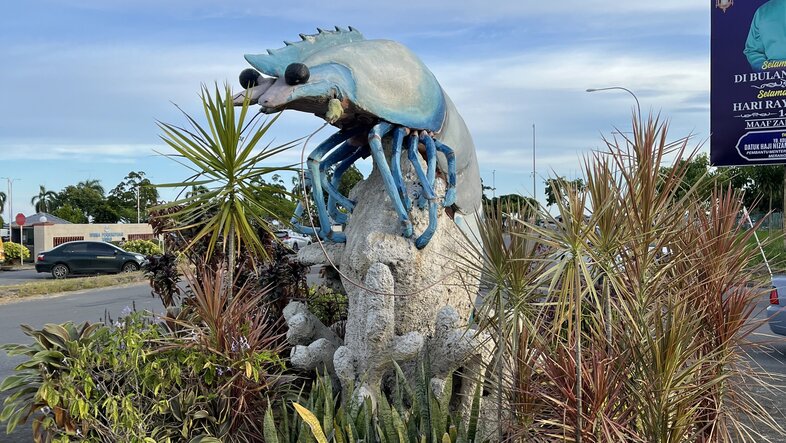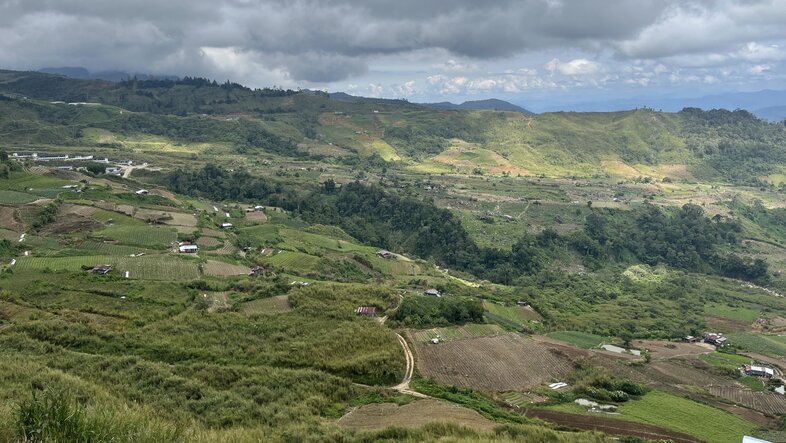From Vienna to Malaysia: analysing the Blue Revolution
In February 2025, I travelled to Sabah (Malaysia) on the island of Borneo to conduct the main field research for my dissertation. Ever since my master's programme, I have been fascinated by how the Blue Revolution – the rapid growth in fisheries and aquaculture production – on the one hand promises prosperity, yet on the other hand creates new dependencies. Sabah is a prime example of this. As the northernmost state of Malaysia, it exports fishery and aquaculture products on a large scale, while many coastal areas remain structurally weak. The coastal areas of Borneo also have a high level of biodiversity with species-rich mangrove forests, sea-grass meadows and coral reefs, which serve as a habitat for numerous marine species.
Malaysia, a country of cultural diversity
- Distance Vienna-Sabah: 10,200 kilometres
- Malaysia consists of two parts separated by the South China Sea: West Malaysia on the Malay Peninsula and East Malaysia on the island of Borneo.
- Kota Kinabalu is the capital of the state of Sabah, which is located in the northern part of the island of Borneo.
- Malaysia's form of government is a parliamentary-constitutional elective monarchy.
The north of Borneo is characterised by distinct rainy and dry seasons as well as a remarkable cultural diversity, characterised by the indigenous Bajau, Dusun and Murut peoples as well as Chinese and Malay influences. It also boasts a coastal landscape that changes within a few kilometres from steep granite cliffs to expansive mangrove swamps. Sabah is highly relevant to my work because it is where local communities, international corporations and national development plans come together in an area that is both ecologically sensitive and economically desirable.
Doctor It! Podcast on research stays abroad
How do you organise, realise and make the most of a research stay abroad? Doctor it! is a podcast run by PhD candidates in the humanities and the social sciences at the University of Vienna. In Episode 5 two scientists talk about their roles as researchers and social human beings in new environments and how they both relied on the support from local people. Find out about lively LGBTQ history in Yugoslavia and land grabbing in southern Africa and learn about the fear of missing out key moments during your stay.
Listen to Doctor it! Episode 5 – Getting abroad wherever you get your podcasts.
Subsistence farming meets international markets
I spent about half of my time in Sabah at the University College Sabah Foundation in Kota Kinabalu, which became the centre of my work and life. Just under five hours' drive away, on the north-east coast is the district of Pitas. In 2010, a large-scale shrimp aquaculture project was established in Pitas – a huge complex comprising hundreds of breeding tanks. The project promised thousands of new jobs and an economic upswing in one of Malaysia's poorest districts. Many residents initially welcomed the project, hoping it would lead to new roads, electricity and jobs.
This case study is so important for my research because it clearly reveals many dynamics and power asymmetries within global production networks. Subsistence farming meets production for international markets, traditional land rights meet private investment, and the state takes on a dual role as investment partner and regulatory authority.
Social and environmental impacts of shrimp aquaculture
My aim was to capture these lines of conflict and their social, ecological and economic consequences from as many perspectives as possible. I want to trace the underlying global production networks with their social and ecological effects in detail, rather than simply viewing them from a statistical distance. Between early February and early June this year, I conducted 55 semi-structured interviews and eleven focus group discussions with smallholder farmers, fishers, current and former workers, community leaders and activists in the area surrounding the project.
To better understand the sector as a whole, I complemented the case study with 44 expert interviews with representatives from government agencies, companies, NGOs and research institutions across coastal Sabah. I also trawled through archive material, newspaper articles, official publications and state statistics. I presented a first part of the findings in a public guest lecture at the University College Sabah Foundation under the title Shrimp Value Chains & Coastal Livelihoods at the end of May.
Vienna Doctoral School of Social Sciences (ViDSS)
The Vienna Doctoral School of Social Sciences (ViDSS) promotes innovative, excellent, problem-oriented research that aspires to contribute to societal debates and address key global challenges. The ViDSS offers a structured doctoral programme and support through cohort integration, career development and different funding programmes. The cohorts trained and supported by the ViDSS are part of a vibrant research environment and international networks.
Unequal power relations
An initial analysis of my field notes reveals three important findings. Firstly, aquaculture is often extremely risky – a single outbreak of disease is often enough to render a company bankrupt. Secondly, a small number of vertically integrated companies are the main beneficiaries, while many small producers are struggling with ever tighter margins. Thirdly, the sales focus is increasingly shifting from export markets to domestic sales channels. This calls into question the image of a purely export-orientated Blue Revolution.
The aquaculture project in Pitas is an example of these dynamics in action. The promised jobs have largely failed to materialise, while over 2,000 hectares of mangrove forests – the basis of life for fishing and subsistence farming – have been cut down. The operating company responsible for this deforestation only received lenient penalties. Many interviewees see this as evidence of unequal power relations between local communities and investors.
Despite the palpable disappointment, resistance has formed on multiple levels, ranging from road blockades and the reforestation of mangrove forests to strategic alliances with NGOs. This clearly shows that local communities are not passive players in global production networks but are actively involved in shaping them.
Leisure time at the hotspots of the Coral Triangle
After long working days on the coast, in the archive or in front of my recording equipment, my favourite way to spend my free time was underwater diving. The coral reefs around Sabah are among the most species-rich hotspots in an area known as the Coral Triangle. Just as unforgettable as the underwater wildlife was the cuisine in Sabah. Spicy Borneo laksa, lemony-marinated hinava from raw fish and freshly grilled ikan bakar accompanied my evenings and gave me a culinary introduction to the local culture.
Three things I brought back with me from Sabah to Vienna:
- USB flash drive with all the audio recordings of my more than 100 interviews and focus group discussions.
- My notebook – faded by the sun – in which I wrote down every conversation, every observation and all my thoughts during my time there.
- A traditional handmade bag made of colourful glass beads – a popular local souvenir and a reminder of Sabah's cultural diversity.
The fieldwork was made possible by the Marietta Blau Grant from the Austrian Agency for International Cooperation in Education and Research (OeAD), which covered my travel, accommodation and research expenses. This financial support played a key role in enabling me to work flexibly on site and make the best possible use of my time. Thanks to an experienced local translator, established networks and close cooperation with my local supervisor, Doctor Gusni Saat, I was able to successfully complete my work by the beginning of June – almost two months earlier than planned. The next step will be to transcribe, translate and systematically analyse more than 100 hours of audio recordings. If I see that something is missing during the evaluation, I will return for a brief follow-up investigation.







